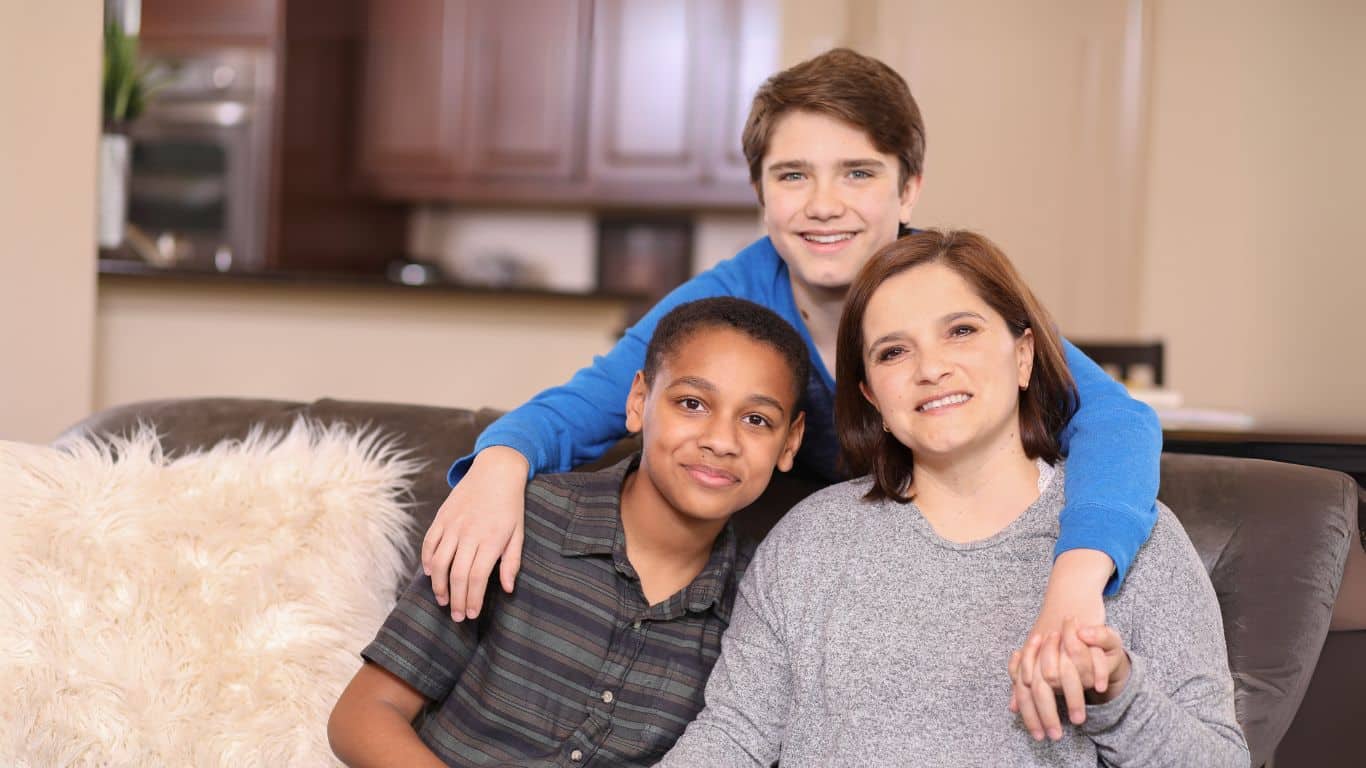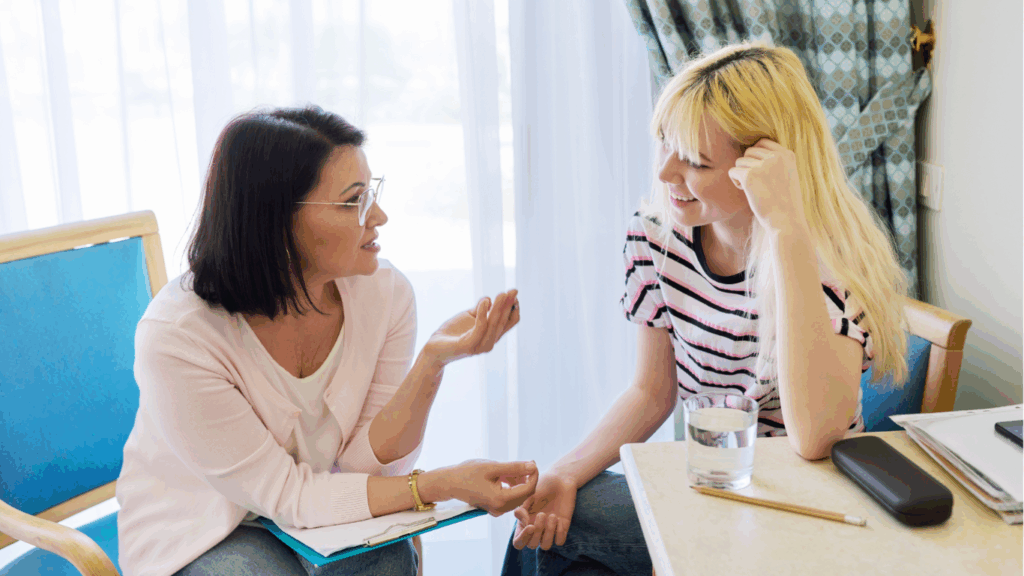Ashleigh Martinflatt is a registered social worker, clinical counsellor, and post-secondary instructor, teaching courses on trauma, child abuse, and neglect in both Social Work and Child and Youth Care degree programs. Most importantly, Ashleigh is an adoptive parent herself.
In part one of this Q&A, Ashleigh shares her expertise on the unique aspects of adopting teenagers, including the differences from adopting younger children, common challenges, and strategies for making teens feel at home.
What are some of the biggest differences when adopting a teenager versus adopting a child?
One of the biggest things that comes to mind is that any child who’s over the age of 12 must clearly state that they want permanency. When they’re younger, permanency is often planned for them and discussed somewhat, but not as explicitly as with those 12 and up, who must verbally consent that permanency is something they want.
Another difference is that the younger the child, the shorter the transition plan. With teenagers or youth transitioning to permanency, we’re going to have a much longer transition plan while they get to know you and you get to know them, allowing that relationship to build more slowly. For all transition plans, but particularly for youth because they have such a clear voice, they’re going to let us know when we need to speed things up or slow things down, and we need to really listen to them during this process.
It’s also important to remember that teenagers are often in the system longer than younger children. Navigating and being in government care can cause its own trauma, so that needs to be taken into consideration as they’re healing, attaching, and getting to know you in their new home. We need to have a deeper understanding of their experiences of not only why they came into care, but their actual experiences while in government care.
Are there any challenges that a parent might face when adopting a teenager versus adopting a child?
One of the things I hear from people is that friends and family are a bit confused about the adoption of or permanency for youth, and they don’t always make the most supportive comments about it. Most people get their knowledge about permanency from Hollywood or sources of information that aren’t accurate. I hear from a lot of families that their family and friends, even if with good intent, say things like “Are you really sure? These kids come with lots of problems.” Comments can have a negative tone compared to the romanticized view of adopting a younger child. Parents need to be aware of how their support network and people around them might respond.
Another challenge is dealing with how much time and how many milestones you’ve missed. I’ve known families, myself included, who’ve experienced grief over things that have been missed that they weren’t there for. It’s important to think about and reflect on how you might work through these strong feelings. Linked to this is that youth in care often have had very challenging experiences, which can lead to guilt and difficult questions from them like “Where was this permanency earlier? Why did I have to go through everything I went through before I got here? Where were you during all these years?” Being prepared to have these discussions can be challenging on your heart and hard to navigate as a parent.
The last thing I would say there are some challenges with, which is for all adoptions but particularly for teens because they have a developing brain, is that you’ll be walking next to a healing person, and this can be raw and emotional. We have a healing, underdeveloped brain in what often looks like an adult-sized body, so sometimes we can be tricked into thinking things should be happening faster or they should be behaving differently. We need to constantly remind ourselves that trauma impacts development, and in many ways, chronological age and stage of development are going to be very different for a teenager. There’s no timeframe for healing from trauma, especially when the brain isn’t fully developed. People need to be prepared to walk alongside that, not fix it, because we can’t fix it. We can just be there to love and provide unconditional support, patience, and permanency as they navigate healing those deep and sometimes multiple wounds.
How can I make my teen feel welcome in my home right away?
I’m not sure anyone can feel super welcome right away, it’s kind of a weird thing when someone moves in, and that’s for any adoption. There will be some moments of uncomfortableness. Being transparent about that can help and just asking things like “This might feel funny, do you feel funny? Are you feeling comfortable getting a drink from the fridge or taking a snack? Do you feel comfortable getting up in the middle of the night to go to the bathroom?” Just really being open and talking about some of the things that might make somebody feel unwelcome.
I encourage people to think about what if you knew someone for a bit and then had to live in their home. What would make you feel welcome, and what would make you feel uncomfortable? Have that discussion and talk it through. Feeling comfortable and welcome is a process, not binary. We just have to allow people to adjust as they get to know us and attach to us.
It’s really important not to take it personally if someone doesn’t welcome right away. Any child or youth who comes home through permanency is feeling and dealing with intense grief, and at the same time, we’re asking them to attach, and that seems like one of the most impossible things we could ask of somebody. There are very few other populations I can think of where we ask someone to do that. We never say to someone at their partner’s funeral, “Hey, are you ready to go start dating?” We let people grieve and then transition to other stages, but with adoption, children and youth are often not afforded that. They’re experiencing two very complex feelings simultaneously.
For some practical tips:
- I worked with a family who adopted a youth and gave them a house key on a special keychain that said “family”, which doesn’t happen to many kids who are in government care. That was a pretty substantial moment for that youth.
- Ask their guardianship worker about their preferences: favourite meals, what detergent they use to wash their sheets so we can make sure their pillows and sheets smell exactly like where they came from if it was a sense of home for them.
- Find out the details that make them unique and wonderful, and incorporate those into your home.
- If you have family pictures on the wall, get pictures of them up there too.
- Put a basket of snacks on the counter or even in their room.
- Make sure they’re clear about what they can touch and access. If the fridge is open to everybody, make extra efforts to share that with them.
- Don’t overwhelm them with people right away. One of the most awesome things about older kids is that we can just ask them: “Do you feel ready to hang out with your new grandparents? Do you feel ready to have a visit with your foster family?”
- Slow things down if that’s needed and spend time together cocooning at home together. Given that complicated process of grief and attachment, don’t put a whole bunch of other expectations. Slow life down a bit and make things as calm and easy as possible.
What things can I do to prepare a teenager to come into my family?
I’m a big supporter of using technology to help families connect with youth prior to meeting. A lot of relationship-building can be done in an arena they’re super comfortable in. Whether that’s through Messenger or Facetime, whatever they’re utilizing, we need to go to them and their comfort zone to help prepare. This can be an easy and powerful way to start building that relationship and help them understand who you are. Go on a virtual tour of your home and neighbourhood. I knew one family that went on a virtual tour of the school the youth was going to attend. Seeing all of these things before meeting their permanency family can alleviate a lot of stress for the teen.
Another important thing is paying close attention to the transition plan and making sure that it’s youth-driven. The youth should also have a lot of say in what the transition plan looks like, with regular check-ins with their guardianship or adoption worker where they can give feedback like “I don’t like us going out for dinner every second night, I’d prefer if we could do this instead.” Trauma often strips us of our power, so we want to work from an empowerment model. Whenever there are appropriate age and stage choices that can be offered, we should be offering those to kids and allowing them to have appropriate control over this next step of their life, which I can only imagine feels very powerless and out of control.
One of the glories of older kids is that you can just ask them “What are the top three things you’re excited about? What are the top three things you’re nervous about?” Then try to work on those. Ask what would help them feel more comfortable on day one, and ask any question that will give you information that can help you prepare for their arrival. Find out specific details: Do they want to bring their own sheets? Do they want to decorate their room? What’s their favourite dinner? Favourite breakfast? Make sure that food is in the home so that way if everything else is different, if they eat Honey Nut Cheerios every morning for breakfast, at least that stays consistent during this huge transition. Try to find those areas where we can bring continuity from their life with them. They’re not starting new, they’re bringing everything with them, so let’s acknowledge that and try to use that as a strength.
Does it matter how old I am when adopting a teen?
You should be older than them, so that would be something important for us to know. But does age really matter? I don’t actually think it does. I think what matters is the match. I know some teenagers who are with younger families, and that’s a good match for them. Some youth do great with single parents, and some want to be with two parents. It all depends on the needs of that child and that’s what we should focus on. So, I don’t think age matters that much, it’s more about your match with them, their life, their interests, your skill set as a potential parent, and whether you can meet their needs. That’s what’s most relevant.





